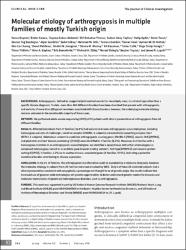| dc.contributor.author | Bayram, Yavuz | |
| dc.contributor.author | Karaca, Ender | |
| dc.contributor.author | Akdemir, Zeynep Çoban | |
| dc.contributor.author | Yılmaz, Elif Ozdamar | |
| dc.contributor.author | Tayfun, Gülsen Akay | |
| dc.contributor.author | Aydın, Hatip | |
| dc.contributor.author | Lupski, James R. | |
| dc.date.accessioned | 2022-05-11T14:42:07Z | |
| dc.date.available | 2022-05-11T14:42:07Z | |
| dc.date.issued | 2016 | |
| dc.identifier.issn | 0021-9738 | |
| dc.identifier.issn | 1558-8238 | |
| dc.identifier.uri | https://doi.org/10.1172/JCI84457 | |
| dc.identifier.uri | https://hdl.handle.net/20.500.11776/9233 | |
| dc.description.abstract | BACKGROUND. Arthrogryposis, defined as congenital, joint contractures in 2 or more body areas, is a clinical sign rather than a specific disease diagnosis. To date, more than 400 different disorders have been described that present with arthrogryposis, and variants of more than 220 genes have been associated with these disorders; however, the underlying molecular etiology remains unknown in the considerable majority of these cases. METHODS. We performed whole exome sequencing (WES) of 52 patients with clinical presentation of arthrogryposis from 48 different families. RESULTS. Affected individuals from 17 families (35.4%) had variants in known arthrogryposis-associated genes, including homozygous variants of cholinergic gamma nicotinic receptor (CHRNG, 6 subjects) and endothelin converting enzyme-like 1 (ECELI, 4 subjects). Deleterious variants in candidate arthrogryposis-causing genes (fibrillin 3 [FBN3], myosin IXA [MY09A], and pleckstrin and Sec7 domain containing 3 [PSD3]) were identified in 3 families (6.2%). Moreover, in 8 families with a homozygous mutation in an arthrogryposis-associated gene, we identified a second locus with either a homozygous or compound heterozygous variant in a candidate gene (myosin binding protein C, fast type (MYBPC2] and vacuolar protein sorting 8 [VPS8], 2 families, 4.2%) or in another disease-associated genes (6 families, 12.5%), indicating a potential mutational burden contributing to disease expression. CONCLUSION. In 58.3% of families, the arthrogryposis manifestation could be explained by a molecular diagnosis; however, the molecular etiology in subjects from 20 families remained unsolved by WES. Only 5 of these 20 unrelated subjects had a clinical presentation consistent with amyoplasia; a phenotype not thought to be of genetic origin. Our results indicate that increased use of genome-wide technologies will provide opportunities to better understand genetic models for diseases and molecular mechanisms of genetically heterogeneous disorders, such as arthrogryposis. FUNDING. This work was supported in part by US National Human Genome Research Institute (NHGRI)/National Heart, Lung, and Blood Institute (NHLBI) grant U54HG006542 to the Baylor-Hopkins Center for Mendelian Genomics, and US National Institute of Neurological Disorders and Stroke (NINDS) grant RO1NS058529 to J.R. Lupski. | en_US |
| dc.description.sponsorship | US NHGRI/NHLBI [U54HG006542]; US NINDSUnited States Department of Health & Human ServicesNational Institutes of Health (NIH) - USANIH National Institute of Neurological Disorders & Stroke (NINDS) [R01NS058529]; CPRIT training Program [RP140102]; Medical Genetics Research Fellowship Program [T32 GM07526]; NATIONAL HUMAN GENOME RESEARCH INSTITUTEUnited States Department of Health & Human ServicesNational Institutes of Health (NIH) - USANIH National Human Genome Research Institute (NHGRI) [U54HG006542] Funding Source: NIH RePORTER; NATIONAL INSTITUTE OF GENERAL MEDICAL SCIENCESUnited States Department of Health & Human ServicesNational Institutes of Health (NIH) - USANIH National Institute of General Medical Sciences (NIGMS) [T32GM007526] Funding Source: NIH RePORTER; NATIONAL INSTITUTE OF NEUROLOGICAL DISORDERS AND STROKEUnited States Department of Health & Human ServicesNational Institutes of Health (NIH) - USANIH National Institute of Neurological Disorders & Stroke (NINDS) [R01NS058529] Funding Source: NIH RePORTER | en_US |
| dc.description.sponsorship | We thank the patients and their families who participated in this study. This work was supported in part by US NHGRI/NHLBI grant U54HG006542 to the Baylor-Hopkins Center for Mendelian Genomics and US NINDS grant R01NS058529 to J.R. Lupski. W.L. Charng is supported by CPRIT training Program RP140102, and T. Harel is supported by the T32 GM07526 Medical Genetics Research Fellowship Program. | en_US |
| dc.language.iso | eng | en_US |
| dc.publisher | Amer Soc Clinical Investigation Inc | en_US |
| dc.identifier.doi | 10.1172/JCI84457 | |
| dc.rights | info:eu-repo/semantics/openAccess | en_US |
| dc.subject | Distal Arthrogryposis | en_US |
| dc.subject | Congenital Contractures | en_US |
| dc.subject | Pterygium Syndrome | en_US |
| dc.subject | Fetal Akinesia | en_US |
| dc.subject | Diagnostic-Approach | en_US |
| dc.subject | Renal Dysfunction | en_US |
| dc.subject | Mutations | en_US |
| dc.subject | Classification | en_US |
| dc.subject | Phenotype | en_US |
| dc.subject | Myopathy | en_US |
| dc.title | Molecular etiology of arthrogryposis in multiple families of mostly Turkish origin | en_US |
| dc.type | article | en_US |
| dc.relation.ispartof | Journal of Clinical Investigation | en_US |
| dc.department | Fakülteler, Tıp Fakültesi, Temel Tıp Bilimleri Bölümü, Tıbbi Biyoloji Ana Bilim Dalı | en_US |
| dc.authorid | 0000-0001-8308-1309 | |
| dc.authorid | 0000-0003-3425-2727 | |
| dc.authorid | 0000-0002-2432-9279 | |
| dc.authorid | 0000-0002-2432-9279 | |
| dc.authorid | 0000-0003-0103-9612 | |
| dc.authorid | 0000-0001-6415-8323 | |
| dc.authorid | 0000-0002-0941-4571 | |
| dc.identifier.volume | 126 | en_US |
| dc.identifier.issue | 2 | en_US |
| dc.identifier.startpage | 762 | en_US |
| dc.identifier.endpage | 778 | en_US |
| dc.institutionauthor | Aydın, Hatip | |
| dc.relation.publicationcategory | Makale - Uluslararası Hakemli Dergi - Kurum Öğretim Elemanı | en_US |
| dc.authorscopusid | 56262251700 | |
| dc.authorscopusid | 16203264000 | |
| dc.authorscopusid | 56503630300 | |
| dc.authorscopusid | 56251785900 | |
| dc.authorscopusid | 26533426400 | |
| dc.authorscopusid | 36240446700 | |
| dc.authorscopusid | 26645221500 | |
| dc.authorwosid | BAYHAN, ILHAN/L-5947-2018 | |
| dc.authorwosid | AYDIN, Hatip/A-2711-2017 | |
| dc.authorwosid | Karaman, Ali/V-5164-2019 | |
| dc.authorwosid | Pehlivan, Davut/I-3235-2019 | |
| dc.authorwosid | Gezdirici, Alper/W-8459-2018 | |
| dc.authorwosid | Gezdirici, Alper/AAG-5480-2019 | |
| dc.authorwosid | aydin, hatip/AAE-5540-2021 | |
| dc.identifier.wos | WOS:000370677300034 | en_US |
| dc.identifier.scopus | 2-s2.0-84956873601 | en_US |
| dc.identifier.pmid | 26752647 | en_US |



















